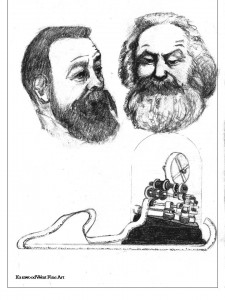Why You’ve Never Heard of Kalman Marx
Posted in On This Day on May 5th, 2009 by Eugene Finerman – 2 CommentsNapoleon Bonaparte was history’s most aggressive liberal. (Bill Maher is a distant second.) The French Revolution and its chief champion swept away the laws that exalted one religion or persecuted another. From France to Poland this spirit of Emancipation–supported by French bayonets–tore down the ghetto walls of a 1000 years.
Of course, when Napoleon fell, the old prejudices and laws returned. The emancipation of the French Revolution and then the restoration of the Old Order had a profound effect on one family in Trier, Germany. When the French army conquered the Rhineland, it abolished the laws that had restricted where Jews could live and how they could earn a living. A rabbi’s son named Herschel Marx now had the freedom to become a lawyer. Unfortunately, after Napoleon’s defeat, Prussia took control of Trier. Prussian law in the early 19th century did not permit Jews to be lawyers. Herschel Marx had a choice: he could abandon his career and return to the ghetto or he could convert. Since he was a lawyer, there is no reason to think that he had principles. He became a Lutheran named Heinrich. The newly christened Heinrich Marx was starting a family and, although his wife Rachel refrained from converting, their children were duly baptized. But for that, Trier Germany might have had a very dyspeptic rabbi named Kalman Marx. Instead, history ended up with a self-proclaimed prophet called Karl.
